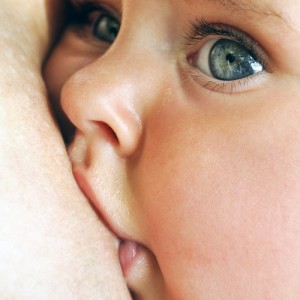 Many mothers set out on a goal to breastfed for 1 year. Often times, mothers find that continuing breastfeeding gets easier as their baby gets older. Mothers often worry less about how much milk their baby is getting and feel more confident in their ability to sustain their baby’s growth during the second half of the first year. It seems breastfeeding an older baby is less complicated and much simpler than nursing a newborn. Older babies are very proficient at breastfeeding – often latching themselves without assistance and draining the breast much more quickly, sometimes in as little as 5 minutes! Indeed, this is a “180” from the early days when breastfeeding babies needed a lot of coaxing to stay awake for feeds and positioning required lots of pillows, and perhaps even an extra set of hands!
Many mothers set out on a goal to breastfed for 1 year. Often times, mothers find that continuing breastfeeding gets easier as their baby gets older. Mothers often worry less about how much milk their baby is getting and feel more confident in their ability to sustain their baby’s growth during the second half of the first year. It seems breastfeeding an older baby is less complicated and much simpler than nursing a newborn. Older babies are very proficient at breastfeeding – often latching themselves without assistance and draining the breast much more quickly, sometimes in as little as 5 minutes! Indeed, this is a “180” from the early days when breastfeeding babies needed a lot of coaxing to stay awake for feeds and positioning required lots of pillows, and perhaps even an extra set of hands!
After their baby’s first birthday (a major breastfeeding milestone!!), some mothers think about weaning from breastfeeding, but aren’t sure their baby is ready. Other mothers decide to extend their breastfeeding goal, sometimes deciding to continue nursing until 18 months, 2 years, or longer. There are numerous reasons mothers may decide to continue nursing after the first year. One such reason is because mothers recognize their baby does not seem ready to give up breastfeeding. Another reason some mothers decide to continue nursing their toddlers is because breast milk continues to provide tremendous health benefits to both mom and child.
Toddlers nurse for comfort and for nutrition, just as young infants do. Breastfeeding is very soothing to babies and toddlers of all ages and can quickly diffuse difficult situations, such as when your toddler scrapes his knee. Nursing a toddler is much different than nursing a newborn. The biggest difference being the duration of feeds. Whereas most newborns nurse for 20 minutes or more during most feedings, toddlers often get all the milk they need in just a few short minutes. Frequency of feedings is also significantly less in most cases. Toddlers may nurse as little as once per day or as much as 6 or 7 times per day, depending on how much alternative milk the child receives. Most pediatricians recommend 16 ounces or so of full-fat animal milk, toddler formula, or breast milk per day for toddlers between 1 and 3 years of age. Children who receive some alternative milk, such as cow’s milk, may nurse very sporadically after the first year. Mothers who returned to work may find breastfeeding easier after the first year because they no longer need to express their breast milk while separated; either because their child nurses enough during the time they are together, or because their child is now able to receive animal milk in addition to human milk.
Breast milk promotes sensory and cognitive development, and protects children against infectious and chronic diseases including: obesity, respiratory illness, ear infections, and SIDS, just to name a few. Breastfeeding contributes to the health and well-being of mothers, too; it helps to lose weight, space children, reduces the risk of ovarian, uterine, endometrial, and breast cancer, diabetes, osteoporosis, rheumatoid arthritis, cardiovascular disease, decreases the risk of postpartum mood disorders (e.g. postpartum depression and anxiety) increases family and national resources, is a secure way of feeding and is safe for the environment.
The benefits of full-term or “extended breastfeeding” (nursing toddlers):
- Breastfeeding continues to be a valuable source of nutrition and disease protection for as long as breastfeeding continues
- Breast milk in the second year postpartum has been shown to contain significantly higher concentrations of total protein, lactoferrin, lysozyme, and Immunoglobulin A
- Breast milk expressed by mothers who have been lactating for 1 year or more has been shown to contain a significantly increased amount fat and energy contents, compared with breast milk expressed by mothers who have nursed for less than 12 months
- Breastfeeding toddlers between the ages of 1 and 3 have been found to have fewer illnesses, illnesses of shorter duration, and lower mortality rates
- Immune factors in breast milk have been shown to INCREASE during the second year
- Children who were breastfed longer tend to get better grades in school and have higher IQ scores thanks to the omega-3 fatty acids, or DHA, that are unique to breast milk
- Extended nursing delays the return of fertility in some women by suppressing ovulation
- Breastfeeding is associated with reduced perceived stress and negative mood in mothers
- Breastfeeding reduces the risk of numerous cancers affecting women, including: breast cancer, ovarian cancer, uterine cancer, and endometrial cancer – the longer a mother nurses, the greater her protection against cancer
- Breastfeeding protects against osteoporosis
- Breastfeeding reduces the risk of rheumatoid arthritis
- Breastfeeding reduces the risk of cardiovascular disease
- Breastfeeding has been shown to decrease insulin requirements and protect again Type 2 diabetes
- Breastfeeding mothers lose weight easier and are better able to maintain a healthy weight while nursing
Breastfeeding does not need to end just because your baby is now a “toddler.” There are plenty of very good reasons to continue nursing past infancy and for as long as it is mutually desired by mom and “baby.” How long you breastfeed should not be influenced by society. Breastfeeding rates around the world are on the rise, and so too are the number of mothers who practice extended or “full-term” breastfeeding. The World Health Organization recommends continued breastfeeding up to 2 years of age or beyond.
There is no truth to the notion that babies should be weaned when they get teeth, learn to walk or talk. Breastfeeding is normal. Extended breastfeeding is normal. Children who are left to self-wean commonly wean sometime after the second year and when they wean it is a very gradual and peaceful process. “Abrupt self-weaning” could in fact be due to a nursing strike. It is common for older nurslings to go days without breastfeeding. This does not always mean weaning has occurred. For most children before age three or so, weaning, spontaneous or mother-initiated, is all but final when two or three weeks have passed without your child asking to nurse. After 2 to 3 weeks without nursing, most toddlers do not ask again, or if they do, they find they have forgotten how to suckle.
For more information on weaning and toddler nursing manners, please visit Kellymom.com.

